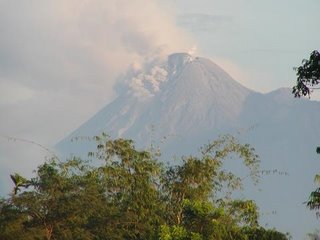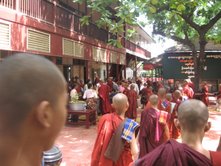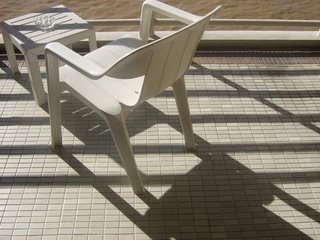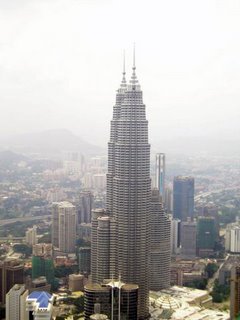It's about dusk and it's raining hard outside the Inquirer office. Inside, I keep glancing at the pictures on the wall as I open this computer. A bond-sized black and white picture of a man wearing a white hospital gown, his face scrunched in pain, his hands pressed onto each other very hard across his chest, as if to absorb what he might have been feeling at the moment. Several hands can be seen near his head and shoulders pulling the white sheets apparently used to carry him. Commander Robot, the caption says. "Galib Andang grimaces in pain as he is carried from a military plane in Villamor Air Base for treatment of his gunshot wounds."
Next to this picture is another bond-sized black and white picture placed perpendicular to the first one. This other picture shows women carrying placards that read, "Palayain ang mga detinidong pulitical na Moro," "Free all Moro political prisoners." The caption says : A Muslim rally in front of DOJ building in Padre Faura as they demand for the investigation of Muslims fall guys during the government's crackdown on terrorists. The pictures are already dated. The shots were taken on December 8, 2003, apparently months before the dreaded Abu Sayyaf leader was killed in what was widely speculated as a prison massacre. I don't know why I keep staring at the picture.
Sunday, October 15, 2006
Thursday, October 12, 2006
Sunday, October 08, 2006
In Search of my Mother's Garden
 Nowadays, I rarely get the chance to talk to my mother, who never ever felt and will never feel at ease with the wildness of my nature. But late in July, I stole the chance to be with her only to stumble upon her garden where everything---from wildflowers to wild ideas---grew in profusion. My mother never had an inkling of the amount of wildness growing in her garden. I found eavesdropping bougainvillas, the secrets of love, fortune, and numerous sensuous delights thriving everywhere.
Nowadays, I rarely get the chance to talk to my mother, who never ever felt and will never feel at ease with the wildness of my nature. But late in July, I stole the chance to be with her only to stumble upon her garden where everything---from wildflowers to wild ideas---grew in profusion. My mother never had an inkling of the amount of wildness growing in her garden. I found eavesdropping bougainvillas, the secrets of love, fortune, and numerous sensuous delights thriving everywhere.



Tuesday, October 03, 2006
Monday, October 02, 2006
Sinful Secrets!
 I was walking along the seedy parts of Uyanguren last Sunday when suddenly I was drawn by an aroma I couldn't resist. After a couple of vain attempts, I finally managed to track down the culprit: inside a thorn-covered shell that the vendor opened up for me to reveal these sinfully delicious secrets!
I was walking along the seedy parts of Uyanguren last Sunday when suddenly I was drawn by an aroma I couldn't resist. After a couple of vain attempts, I finally managed to track down the culprit: inside a thorn-covered shell that the vendor opened up for me to reveal these sinfully delicious secrets! A dear friend Janis, who just flew in from Manila, had something to say about durian, which fortunately she tasted for the first time last Sunday: It's a fruit that doesn't know any subtlety, doesn't pretend and doesn't hide anything. It tastes and smells as it should.Its taste is strong and heady, like spice. It lends itself out in the open without pretensions, without shame. It dares exposed itself to the world and because of this, it is simply, deliciously scandalous in both its smell and taste!
Thursday, September 21, 2006
Synchronicity
But it's not serendipity but synchronicity, as the venerable Butch Dalisay pointed out here.
Saturday, September 16, 2006
The Tale of the A Bao A Qu
 On my last night in Kuala Lumpur, I was supposed to go looking for the book, “Indigenous Politics, Development and Identity in Peninsular Malaysia,” by Colin Nicholas for my article on the Orang Asli when I found myself straying inside Borders bookstore at the Berjaya Time Square. There, I found a collection of writings in translation by Argentinian author Jorge Luis Borges. I texted this mystical friend whom everybody called Antares, who was not impressed by Borges at all--—and why would he be? His interests were not earthbound, I found out later. “What crazy idea gets into your head?” he texted back. So, I horded all those Borgesian books in my arms, all in a swoop, found some cushioned chairs, picked up “The Book of Imaginary Beings” and began reading the tale of the A Bao A Qu:
On my last night in Kuala Lumpur, I was supposed to go looking for the book, “Indigenous Politics, Development and Identity in Peninsular Malaysia,” by Colin Nicholas for my article on the Orang Asli when I found myself straying inside Borders bookstore at the Berjaya Time Square. There, I found a collection of writings in translation by Argentinian author Jorge Luis Borges. I texted this mystical friend whom everybody called Antares, who was not impressed by Borges at all--—and why would he be? His interests were not earthbound, I found out later. “What crazy idea gets into your head?” he texted back. So, I horded all those Borgesian books in my arms, all in a swoop, found some cushioned chairs, picked up “The Book of Imaginary Beings” and began reading the tale of the A Bao A Qu: "To see the most lovely landscape in the world, a traveler must climb the Tower of Victory in Chitor. A winding staircase gives access to the circular terrace on top, but only those who do not believe in the legend dare climb the tower. On the stairway there has lived since the beginning of time a being sensitive to the many shades of the human soul known as A Bao A Qu. It sleeps until the approach of a traveler and some secret life within it begins to glow and its translucent body begins to stir. As the traveler climbs the stairs, the being regains consciousness and follows at the traveler's heels, becoming more intense in bluish color and coming closer to perfection. But it achieves its ultimate form only at the topmost step, and only when the traveler is one who has already attained Nirvana, whose acts cast no shadows. Otherwise, the being hesitates at the final step and suffers at its inability to achieve perfection. It tumbles to the first step as the traveler climbs down and collapses weary and shapeless, awaiting the approach of the next traveler. In the course of the centuries, A Bao A Qu has reached the terrace only once."
"To see the most lovely landscape in the world, a traveler must climb the Tower of Victory in Chitor. A winding staircase gives access to the circular terrace on top, but only those who do not believe in the legend dare climb the tower. On the stairway there has lived since the beginning of time a being sensitive to the many shades of the human soul known as A Bao A Qu. It sleeps until the approach of a traveler and some secret life within it begins to glow and its translucent body begins to stir. As the traveler climbs the stairs, the being regains consciousness and follows at the traveler's heels, becoming more intense in bluish color and coming closer to perfection. But it achieves its ultimate form only at the topmost step, and only when the traveler is one who has already attained Nirvana, whose acts cast no shadows. Otherwise, the being hesitates at the final step and suffers at its inability to achieve perfection. It tumbles to the first step as the traveler climbs down and collapses weary and shapeless, awaiting the approach of the next traveler. In the course of the centuries, A Bao A Qu has reached the terrace only once." On my way home, I regretted not buying the book, which I thought was much too expensive for my pocket!
On my way home, I regretted not buying the book, which I thought was much too expensive for my pocket! It was not until more than a week later, when I was already back in Davao that I opened the magickriver website inside Clickerz Café along Ponciano and began reading Antares’ account of the A Bau A Qu.
I was amazed. Is this Antares, who scoffed at the mention of Borges, who actually traced the Malayan origin of the Borges’ tale by an American scholar based in Alexandria, Egypt?
How could I not be awed by the serendipitous designs of these encounters? First, it was my last night in KL, when it finally dawned on me that I could no longer talk to Colin Nicholas, an anthropologist deeply involved in the issues of indigenous peoples in Peninsular Malaysia. He just left for Penang that morning. His book was the last chance for me to get to know anything substantial about the Orang Asli but it was only available in a certain bookstore, not in the commercial ones like Borders. Knowing that I did not know how to get to that bookstore, I gave up hope, decided to call off my search and strayed inside a bookstore.
How come that the first story I came across was a tale that actually came from an Orang Asli?? And how come I never knew I was actually bringing it back with me on my way back to Davao?
Estranged!
Not until after talking to Datu Teng Odin on the phone (he is the secretary of Mayor Muslimin Sema in Cotabato city), while pursuing this story for Newsbreak, did I find how little did I ever know about the different and differing cultures in Mindanao.
Because I did not want to tell him outright that all I wanted to know was Misuari’s age, I asked Datu Odin if he knew when was it this year that the chair of the Moro National Liberation Front (MNLF) celebrated his birthday.
He said, he did not know because they don’t normally celebrate birthdays. Muslims don’t, generally. In fact, he said, Mayor Sema did not use to celebrate birthdays but after he ran for public office, he has often given in to pressures even if he did not want to. Mayor Sema was among the 15 MNLF central committee members who wrested control of the MNLF and ousted Misuari---about six years ago, three or four years after the peace pact with the Ramos government. After they also got their own dose of acrid tasting government betrayal three years after betraying Misuari, they have all decided to patch it up with the Moro leader, who until now, is still in jail without trial.
Because I did not want to tell him outright that all I wanted to know was Misuari’s age, I asked Datu Odin if he knew when was it this year that the chair of the Moro National Liberation Front (MNLF) celebrated his birthday.
He said, he did not know because they don’t normally celebrate birthdays. Muslims don’t, generally. In fact, he said, Mayor Sema did not use to celebrate birthdays but after he ran for public office, he has often given in to pressures even if he did not want to. Mayor Sema was among the 15 MNLF central committee members who wrested control of the MNLF and ousted Misuari---about six years ago, three or four years after the peace pact with the Ramos government. After they also got their own dose of acrid tasting government betrayal three years after betraying Misuari, they have all decided to patch it up with the Moro leader, who until now, is still in jail without trial.
The Blogging Magic
“But what’s the use of writing anything if no one gets to read it?” asked Caloi, when he first heard of the irony of blogging in secret.
Dasia had a way of describing it: it was like shutting the door of your room to whisper your deepest secrets live on the radio.
I just paused in the doorway of davaotoday.com and did not reply.
The idea of a secret blog floating in the worldwide web, just waiting to be discovered, continued to enchant me, like magic. How can I experience magic if I continuously prattle about it?
On May 29, the magic seemed to be working. I was still in Kuching, Sarawak, inside the Medan Pelita cyber café, desperately looking for the next place to stay in KL the following day, when I came upon this blog by fil-am poet Luisa Igloria.
It was not until about a month later, when I was back in Davao that I was able to write her. She was still recovering from a loss and was about to embark on her writing residency at Ragdale Foundation in Lake Forest, Illinois.
Ragdale, she said, was a rare break she’s giving herself from the numerous demands she has to meet as full time mother, full time professor, full time wife and numerous roles she has to play in-between aside from being a woman writer. She sent a picture of a sundial she discovered while taking a walk in the garden at Ragdale and for a moment, it felt like I was there with her! Heh, ilusyonada!
It’s a pity that I’ve just returned to blogging now, I hope it’s not yet too late to say how she wanted to share the rare treat she had enjoyed in her yellow room at Ragdale by inviting ALL Filipino writers, artists, composers to go online, to open the Ragdale website ASAP, find out what’s in store for them there and apply, apply, apply! Luisa Igloria also blogs.
Dasia had a way of describing it: it was like shutting the door of your room to whisper your deepest secrets live on the radio.
I just paused in the doorway of davaotoday.com and did not reply.
The idea of a secret blog floating in the worldwide web, just waiting to be discovered, continued to enchant me, like magic. How can I experience magic if I continuously prattle about it?
On May 29, the magic seemed to be working. I was still in Kuching, Sarawak, inside the Medan Pelita cyber café, desperately looking for the next place to stay in KL the following day, when I came upon this blog by fil-am poet Luisa Igloria.
It was not until about a month later, when I was back in Davao that I was able to write her. She was still recovering from a loss and was about to embark on her writing residency at Ragdale Foundation in Lake Forest, Illinois.
Ragdale, she said, was a rare break she’s giving herself from the numerous demands she has to meet as full time mother, full time professor, full time wife and numerous roles she has to play in-between aside from being a woman writer. She sent a picture of a sundial she discovered while taking a walk in the garden at Ragdale and for a moment, it felt like I was there with her! Heh, ilusyonada!
It’s a pity that I’ve just returned to blogging now, I hope it’s not yet too late to say how she wanted to share the rare treat she had enjoyed in her yellow room at Ragdale by inviting ALL Filipino writers, artists, composers to go online, to open the Ragdale website ASAP, find out what’s in store for them there and apply, apply, apply! Luisa Igloria also blogs.
Friday, September 15, 2006
The Dangers of Straddling Lines
“He will straddle the line, aware up to the point of knowing he is getting the worst of both worlds, but never stopping to wonder why there should ever have been a line, or even if there is a line at all. He will learn how to be a twinned man and will go on at the game, straddling until he splits up the crotch and in half from the prolonged tension, and then he will be destroyed.”---Thomas Pyncheon, “V”
I have never been any good at straddling lines, though, once or twice, I had been foolishly at it, trying to work for a government press office, while once in a while writing stories for the newspapers, which everybody else around me was doing, anyway; each of us trying to pass herself off as a journalist even if she were associated, one way or another with some interest group or office. Shame on me, indeed, and what a shame!
But unlike most of my peers who were valiantly succeeding at the game, I was failing miserably. I never quite became the “twinned woman” that Pyncheon meant, feeling deep in my gut that there has to be that line somewhere, which I can’t see but which I may have to pay with my life and sanity for crossing or straddling it; and straddling it had felt like a curse.
So, I did not actually split up my crotch in half from the prolonged tension because I was already falling then. I was already deep in the rut when I felt the last gasp of my own life force pulling me out of that hellhole.
Crossing that invisible line to the other side, I discovered how many people have been at the game, splitting their crotches in half in prolonged tension, self-destructing. Straddling lines have been a reality in the country’s journalism profession, which for most people, promised much power but not much pay; and straddling lines have been used by powers-that-be to justify the killings of journalists in the country, now dubbed as the world’s worst place for journalists to be.
Yet, who am I in this world to condemn or even to badmouth the “straddlers?” Vergel Santos, a hardliner in this respect, had even said (during the 5th National Union of Journalists of the Philippines national congress in Tagaytay)—that even freedom is not for free. It comes with a price, he said, and you pay for it in various currencies. You may have to pay for it with courage, or passion, or love, he said.
The impulse to create or to write is not something that one can summon at will just because somebody else is telling one to do it. When someone out there is forcing me to write a story that I don’t want to write in the first place, I get the urge to run and crawl back to the borders, where lines get blurred and where the overwhelming stench of death and decay can easily make one blind.
I have never been any good at straddling lines, though, once or twice, I had been foolishly at it, trying to work for a government press office, while once in a while writing stories for the newspapers, which everybody else around me was doing, anyway; each of us trying to pass herself off as a journalist even if she were associated, one way or another with some interest group or office. Shame on me, indeed, and what a shame!
But unlike most of my peers who were valiantly succeeding at the game, I was failing miserably. I never quite became the “twinned woman” that Pyncheon meant, feeling deep in my gut that there has to be that line somewhere, which I can’t see but which I may have to pay with my life and sanity for crossing or straddling it; and straddling it had felt like a curse.
So, I did not actually split up my crotch in half from the prolonged tension because I was already falling then. I was already deep in the rut when I felt the last gasp of my own life force pulling me out of that hellhole.
Crossing that invisible line to the other side, I discovered how many people have been at the game, splitting their crotches in half in prolonged tension, self-destructing. Straddling lines have been a reality in the country’s journalism profession, which for most people, promised much power but not much pay; and straddling lines have been used by powers-that-be to justify the killings of journalists in the country, now dubbed as the world’s worst place for journalists to be.
Yet, who am I in this world to condemn or even to badmouth the “straddlers?” Vergel Santos, a hardliner in this respect, had even said (during the 5th National Union of Journalists of the Philippines national congress in Tagaytay)—that even freedom is not for free. It comes with a price, he said, and you pay for it in various currencies. You may have to pay for it with courage, or passion, or love, he said.
The impulse to create or to write is not something that one can summon at will just because somebody else is telling one to do it. When someone out there is forcing me to write a story that I don’t want to write in the first place, I get the urge to run and crawl back to the borders, where lines get blurred and where the overwhelming stench of death and decay can easily make one blind.
Tuesday, August 01, 2006
Monday, July 31, 2006
Sunday, July 30, 2006
Rhymes for Rockman Pace
One o'clock, two o'clock, three o'clock, ROCK! Four o'clock, five o'clock, six o'clock ROCK!
Radio listeners in Davao del Sur's sleepy town of Digos have been used to hearing this familiar nursery rhyme precedes the program of "Rockman Pace," followed by his scathing remarks as he used to go on air. He was known all over Digos as "The Rockman," a hardhitting broadcaster, the Digos counterpart of the anti-communist crusader Juan Porras Pala, who died several years earlier from the hands of unidentified gunmen.
One afternoon in July, the Rockman went out of the radio station to buy chicken for lunch. He fell on the pavement near Digos' BPI Bank Building when a shot rang out and two gunmen escaped on a motorcycle. He was ninth in the list of journalists killed in the Philippines this year, according to the list of the National Union of Journalists of the Philippines.
It was eerily quiet in Digos city the following day. Nobody was playing the rhyme on the air. For a while it looked like everybody was saying that the Rockman never criticised anybody on the air, that he mellowed down a bit in the last few months in the radio station where he worked. Until one noted the gestures, the shrugs, the frowns, the smirks from the people's faces when they talked or stopped talking about him.
"He must have angered 'someone big,'" a peddy cab driver blurted out as his vehicle swerved into the gravelly path leading to the Rockman's house.
In the town of Digos, like in most of the country's small towns, one begins to be aware of 'big people' and 'small people' all around. For their own safety, 'small people' are aware of their smallness. They are careful (and think they have to be careful) not to anger 'big people' who can do anything to them. They're saying: Look, what happened to Pace! See??!
No wonder nobody is talking.
Radio listeners in Davao del Sur's sleepy town of Digos have been used to hearing this familiar nursery rhyme precedes the program of "Rockman Pace," followed by his scathing remarks as he used to go on air. He was known all over Digos as "The Rockman," a hardhitting broadcaster, the Digos counterpart of the anti-communist crusader Juan Porras Pala, who died several years earlier from the hands of unidentified gunmen.
One afternoon in July, the Rockman went out of the radio station to buy chicken for lunch. He fell on the pavement near Digos' BPI Bank Building when a shot rang out and two gunmen escaped on a motorcycle. He was ninth in the list of journalists killed in the Philippines this year, according to the list of the National Union of Journalists of the Philippines.
It was eerily quiet in Digos city the following day. Nobody was playing the rhyme on the air. For a while it looked like everybody was saying that the Rockman never criticised anybody on the air, that he mellowed down a bit in the last few months in the radio station where he worked. Until one noted the gestures, the shrugs, the frowns, the smirks from the people's faces when they talked or stopped talking about him.
"He must have angered 'someone big,'" a peddy cab driver blurted out as his vehicle swerved into the gravelly path leading to the Rockman's house.
In the town of Digos, like in most of the country's small towns, one begins to be aware of 'big people' and 'small people' all around. For their own safety, 'small people' are aware of their smallness. They are careful (and think they have to be careful) not to anger 'big people' who can do anything to them. They're saying: Look, what happened to Pace! See??!
No wonder nobody is talking.
Sunday, July 02, 2006
Leizel survives Jogjakarta!
Leizel's email on May 28 almost shook the SEAPA fellows dispatched to different parts of Southeast Asia for the one month coverage of their proposed stories in the second country of their choice. In Malaysia, I was wondering why Leizel--the third fellow from the Philippines dispatched to Indonesia--felt she was "so blessed to be alive." On her email, the story began to unfold.
"When I left Baguio (for the SEAPA fellowship), I told myself I’m going for an adventure of a lifetime. And I guess I got what I was looking for - to be right in the middle of a disaster while writing my story. Jogja was in chaos a few hours before I left last Saturday. People were crying and running in the streets, thinking that a tsunami would follow. I really thought it was the end of me. (I just amused myself with the thought that my mother would get an insurance money after I die. Hehe!). Bantul in Southern Jogja, was the most hardly hit. I was there the whole day on Thursday, two days before the earthquake struck.

As I was riding on a taxi to Solo, I realized that good people are everywhere. And they appear when you need them most. I met Moslems and Christians (3 Catholics and 2 Evangelicals) who generously gave their time to make my stay in Jogja meaningful. Eventhough it was my first time to meet all of them, they took a lot of effort to make sure I would leave Jogja fast. Well, I just couldn’t imagine myself dying in a foreign country with nobody to identify my body."
We read the rest of the story in the headline stories of that day. Leizel emails on to say that these Merapi shots were taken by Purwani Prabandari ("Dari"), one of Tempo's editors with whom she stayed with in Jakarta. Purwani took the pictures from Klaten, her hometown.
"When I left Baguio (for the SEAPA fellowship), I told myself I’m going for an adventure of a lifetime. And I guess I got what I was looking for - to be right in the middle of a disaster while writing my story. Jogja was in chaos a few hours before I left last Saturday. People were crying and running in the streets, thinking that a tsunami would follow. I really thought it was the end of me. (I just amused myself with the thought that my mother would get an insurance money after I die. Hehe!). Bantul in Southern Jogja, was the most hardly hit. I was there the whole day on Thursday, two days before the earthquake struck.

As I was riding on a taxi to Solo, I realized that good people are everywhere. And they appear when you need them most. I met Moslems and Christians (3 Catholics and 2 Evangelicals) who generously gave their time to make my stay in Jogja meaningful. Eventhough it was my first time to meet all of them, they took a lot of effort to make sure I would leave Jogja fast. Well, I just couldn’t imagine myself dying in a foreign country with nobody to identify my body."
We read the rest of the story in the headline stories of that day. Leizel emails on to say that these Merapi shots were taken by Purwani Prabandari ("Dari"), one of Tempo's editors with whom she stayed with in Jakarta. Purwani took the pictures from Klaten, her hometown.
Friday, June 30, 2006
What Wahyuana Brings from Burma

After risking his limbs entering the borders, Indonesian fellow Wahyuana finally sends me an image of Burma. The laptop where he kept the images of the Shwe Dagun temple (and another temple more striking than Shwe Dagun!) crashed as soon as he arrived in Jakarta.
Damn! Wahyu writes on the email. I have all my pictures there!
But I thank Wahyu for saving one image for me--the image of the monks at the Mahagondayone Monastery in Amapura, Mandalay in North Burma--is one image I can hang on to, at least for a while.
Thursday, June 22, 2006
Monday, June 12, 2006
Escape from Burma
"Wahyu, you must be crazy!" I was in the lobby of the Rose Garden Hotel--a resort on Thailand's Nakorn Pathom, 32 km west of downtown Bangkok--with Wahyuana, the fellow from Indonesia on his way to Burma at the start of the Southeast Asian Press Alliance (SEAPA) journalism fellowship this year.
"Vhy?" He asked in that Indonesian accent I found amusing.
"Why are you going to Burma?"
He turned to me, puzzled.
"Vhy should I not go to Burma?"
"Because look at them---" I glanced at Myo Zaw and Than Win Htut, the two Burmese on exile here in Thailand, coming out of the hotel elevator on their way to the lobby. "People are going out of Burma, see? Myo Zaw and Win Htut are here, see? They're just too happy to get out of Burma but you, Wahyu, you're going to Burma---Why do you want to go to Buhma? You must be crazy, Vahyu!"
On the eve of our departure to the second country (and for Wahyu, that was to be Burma), tension and uncertainty was up in the air. Even the loud Thai pop song that was playing in the restaurant where we ate spicy Thai food did not help dissipate the tension.
"If you're in Buhma, you can't mention my name!" Win Htut warned Wahyu during our pre-departure briefing. "You mention my name??! You go to prison!" He punctuated his statement with very strong gestures and wild pursing of his mouth. Then, after a while, he said, "But you can mention Myo Zaw. Myo Zaw is a friendly name, he's safe. He's popular among the academics. But me? Everybody is looking for me in Buhma!"
In Buhma, talk only to certain people who will be referred to you by trusted people. These trusted people should also be referred to you by another set of trusted people, Myo Zaw said.
"You should always be careful when you move around! They don't want journalists in Buhma! "
On the internet at the hotel lobby, I chanced upon the computer which Wahyu had been using before I came in. On the screen were images of pain---bandaged arms, blown up bodies, stitched scalps, bloody heads. Those were images of Burma.
"What is in Burma that really fascinates you, Wahyu? Makes you want to go there?"
"I vant to go there because I vant to understand."
"Understand what? You want to understand Burma??"
"No, not Buhma. I vant to unduhstand Moluccas. In Moluccas, people get slaughtered. My friend died in Moluccas. Sometimes, I interview people in Moluccas and then the next thing that I know, they're dead already. I saw the bodies in Moluccas. They used to make me--(he gestures throwing up)! Now, I want to go to Burma to understand these things. Because I don't understand."
I could never write the exact way that Wahyu talk. But this was how, our short talk went before he left for Buhma. In Buhma, he talked to the monks. He went there as a tourist, like Paul Theroux, I joked. "Never talk of politics," he kept saying over and over again, like a mantra. Instead, talk about the price of watches, I said.
He went to Buhma to understand Moluccas. I went to Malaysia and crossed a river in Sarawak because I did not understand anything. Yesterday, Wahyu arrived in Bangkok, at last, to see the rest of the fellows arriving from the second country of our choices. "So, howz Buhma, Wahyu???" everybody was asking.
"No good food in Buhma!" was his conclusion as SEAPA made us sit down to dinner at Bangkok's Royal River Hotel, where we're staying to write our stories.
"Vhy?" He asked in that Indonesian accent I found amusing.
"Why are you going to Burma?"
He turned to me, puzzled.
"Vhy should I not go to Burma?"
"Because look at them---" I glanced at Myo Zaw and Than Win Htut, the two Burmese on exile here in Thailand, coming out of the hotel elevator on their way to the lobby. "People are going out of Burma, see? Myo Zaw and Win Htut are here, see? They're just too happy to get out of Burma but you, Wahyu, you're going to Burma---Why do you want to go to Buhma? You must be crazy, Vahyu!"
On the eve of our departure to the second country (and for Wahyu, that was to be Burma), tension and uncertainty was up in the air. Even the loud Thai pop song that was playing in the restaurant where we ate spicy Thai food did not help dissipate the tension.
"If you're in Buhma, you can't mention my name!" Win Htut warned Wahyu during our pre-departure briefing. "You mention my name??! You go to prison!" He punctuated his statement with very strong gestures and wild pursing of his mouth. Then, after a while, he said, "But you can mention Myo Zaw. Myo Zaw is a friendly name, he's safe. He's popular among the academics. But me? Everybody is looking for me in Buhma!"
In Buhma, talk only to certain people who will be referred to you by trusted people. These trusted people should also be referred to you by another set of trusted people, Myo Zaw said.
"You should always be careful when you move around! They don't want journalists in Buhma! "
On the internet at the hotel lobby, I chanced upon the computer which Wahyu had been using before I came in. On the screen were images of pain---bandaged arms, blown up bodies, stitched scalps, bloody heads. Those were images of Burma.
"What is in Burma that really fascinates you, Wahyu? Makes you want to go there?"
"I vant to go there because I vant to understand."
"Understand what? You want to understand Burma??"
"No, not Buhma. I vant to unduhstand Moluccas. In Moluccas, people get slaughtered. My friend died in Moluccas. Sometimes, I interview people in Moluccas and then the next thing that I know, they're dead already. I saw the bodies in Moluccas. They used to make me--(he gestures throwing up)! Now, I want to go to Burma to understand these things. Because I don't understand."
I could never write the exact way that Wahyu talk. But this was how, our short talk went before he left for Buhma. In Buhma, he talked to the monks. He went there as a tourist, like Paul Theroux, I joked. "Never talk of politics," he kept saying over and over again, like a mantra. Instead, talk about the price of watches, I said.
He went to Buhma to understand Moluccas. I went to Malaysia and crossed a river in Sarawak because I did not understand anything. Yesterday, Wahyu arrived in Bangkok, at last, to see the rest of the fellows arriving from the second country of our choices. "So, howz Buhma, Wahyu???" everybody was asking.
"No good food in Buhma!" was his conclusion as SEAPA made us sit down to dinner at Bangkok's Royal River Hotel, where we're staying to write our stories.
Friday, June 09, 2006
News from Home
The other day, a friend in KL could not help grabbing the newspaper when the headlines showed Dr. Tun Mahathir criticizing his successor for being so ungrateful as to reveal that the government has been losing money for the mega projects built during his reign. This friend is the kind who (like me) never give a damn about politics but was forced to participate in his country's elections in the previous year because, he said, he was getting sick and tired of the Barisa National, the ruling party which has dominated the politics and economics of Malaysia and there's no other way to see it go but to vote for the opposition. Seeing Dr. Tun Mahathir fumed like hell on the headlines really made his day, he was overjoyed! On the story, more and more people---most of them, from the government, of course---are defending the Pak Lah (the endearing term they use to refer to the Prime Minister, who is Datuk Seri Abdullah Ahmad Badawi)!
Except for this rare treat, though, reading the newspapers of Malaysia makes me feel something is missing.
Dr. James Chin of the University of Malaysia (UNIMAS) in the state of Sarawak compares the current state of the press in Malaysia to the press in the Philippines during the reign of Marcos. "All you read there are press statements from the government," he whispered, over a cup of the Malaysian version of halo-halo. Now, if there's anything that glossing over the copies of the Sarawak-based "Borneo Post" or the Peninsula-centered "The Star" and "New Strait Times," it makes me crave for news from home. I love the way that journalists--and editors---in the Philippines painstakingly choose the details to make the story sharp and crisp. I also love the kind of stories that we write. It is so amusing that--when a few kababayans I happen to meet here project a rather "sanitized" image of home, I find the history of struggle in the Philippines against oppressive regimes something to be talked about. This history of struggle has become so advanced and successful that even Malaysian activists are looking up to it with awe and inspiration. That's why, news still trickle to my email, mostly about the counts of how many activists and journalists have died under the hands of the present regime. They came in handy when people start asking about the country under President Arroyo who continued to cling to power despite her being so unpopular and all the unanswered questions about the previous election. What's happening back home forms part of the experience of Southeast Asia, a region that is supposed to share an experience and a culture, but after having been torn apart and subdivided by different colonizers about half a millennium ago, now find themselves strangers to each other.
Except for this rare treat, though, reading the newspapers of Malaysia makes me feel something is missing.
Dr. James Chin of the University of Malaysia (UNIMAS) in the state of Sarawak compares the current state of the press in Malaysia to the press in the Philippines during the reign of Marcos. "All you read there are press statements from the government," he whispered, over a cup of the Malaysian version of halo-halo. Now, if there's anything that glossing over the copies of the Sarawak-based "Borneo Post" or the Peninsula-centered "The Star" and "New Strait Times," it makes me crave for news from home. I love the way that journalists--and editors---in the Philippines painstakingly choose the details to make the story sharp and crisp. I also love the kind of stories that we write. It is so amusing that--when a few kababayans I happen to meet here project a rather "sanitized" image of home, I find the history of struggle in the Philippines against oppressive regimes something to be talked about. This history of struggle has become so advanced and successful that even Malaysian activists are looking up to it with awe and inspiration. That's why, news still trickle to my email, mostly about the counts of how many activists and journalists have died under the hands of the present regime. They came in handy when people start asking about the country under President Arroyo who continued to cling to power despite her being so unpopular and all the unanswered questions about the previous election. What's happening back home forms part of the experience of Southeast Asia, a region that is supposed to share an experience and a culture, but after having been torn apart and subdivided by different colonizers about half a millennium ago, now find themselves strangers to each other.
Saturday, June 03, 2006
A Rush of Memories
I never trusted my memory since I arrived in Malaysia. I just felt that words had ceased all production of meanings. Masjid Jamek, Tun Sumbanthan, Puduraya, Hang Tuah, Majaralela, Tun Abdulrahman and Menara Tun Razak never meant anything to me although I was forced to memorize them everyday just to get to where I was going. Most often, I was going somewhere at the 27th or 30th floor of buildings that all looked the same.
So, just to make friends with these strangers, I kept rolling them in my tongue as I inserted bills and pulled out cards at the Putra Train station, hoping that my mind can accommodate their strangeness. Only to discover a couple of steps from the train platform that they had all slipped away. How can I hold on to something that I didn't possess in the first place? I asked as I grappled with wild moments of panic.
I easily lost the memories of names because I never had any memory of the language in the first place. How many times did I catch Mujtaba (Taba), our Indonesian fellow, bursting with laughter because I mangled words in Bahasa and chopped and inverted names? He snickered when I asked the Indonesian fellow Wahyu, if his full name was Wayuatta instead of Wahyuana.
My mind seemed to be playing tricks on me because I thought the Burmese fellow's name was Zio Meow instead of Myo Zaw. After a short talk with Malaysiakini editor Stephen Gan, I stopped at the train platform to ask Taba again what the word "bumaputri" meant? Mujtaba, who was already having trouble how to juggle his work schedules with the time that his band of Malaysian friends wanted him to spend with them, frowned in confusion.
"Ahh! You mean, bumiputra!" he burst out laughing again.
That was why, after I left my cellphone in a faraway village of Sarawak, I was amazed to find out that I remembered the 12-digit telephone number that was supposed to be my lifeline. It was the only strange proof that my memory was working! On my way back to Kuching, I was prompted to remember a name that Prof. Wong Meng Chou had mentioned, but which I had kept inside my notebook and locked inside my luggage in a guesthouse in Kuching. I did not trust my memory to remember strange Chinese names at all. But all of a sudden, the name of Sem Kiong floated in my mind like magic. He was the person I was supposed to track down the Sarawak village of Belaga (pronounced B'laga here) to get to the bottom of my story.
Now, I know, my memory is working, at last, as I begin to feel comfortable in the increasingly familiar Kuching surroundings!
So, just to make friends with these strangers, I kept rolling them in my tongue as I inserted bills and pulled out cards at the Putra Train station, hoping that my mind can accommodate their strangeness. Only to discover a couple of steps from the train platform that they had all slipped away. How can I hold on to something that I didn't possess in the first place? I asked as I grappled with wild moments of panic.
I easily lost the memories of names because I never had any memory of the language in the first place. How many times did I catch Mujtaba (Taba), our Indonesian fellow, bursting with laughter because I mangled words in Bahasa and chopped and inverted names? He snickered when I asked the Indonesian fellow Wahyu, if his full name was Wayuatta instead of Wahyuana.
My mind seemed to be playing tricks on me because I thought the Burmese fellow's name was Zio Meow instead of Myo Zaw. After a short talk with Malaysiakini editor Stephen Gan, I stopped at the train platform to ask Taba again what the word "bumaputri" meant? Mujtaba, who was already having trouble how to juggle his work schedules with the time that his band of Malaysian friends wanted him to spend with them, frowned in confusion.
"Ahh! You mean, bumiputra!" he burst out laughing again.
That was why, after I left my cellphone in a faraway village of Sarawak, I was amazed to find out that I remembered the 12-digit telephone number that was supposed to be my lifeline. It was the only strange proof that my memory was working! On my way back to Kuching, I was prompted to remember a name that Prof. Wong Meng Chou had mentioned, but which I had kept inside my notebook and locked inside my luggage in a guesthouse in Kuching. I did not trust my memory to remember strange Chinese names at all. But all of a sudden, the name of Sem Kiong floated in my mind like magic. He was the person I was supposed to track down the Sarawak village of Belaga (pronounced B'laga here) to get to the bottom of my story.
Now, I know, my memory is working, at last, as I begin to feel comfortable in the increasingly familiar Kuching surroundings!
Subscribe to:
Posts (Atom)





